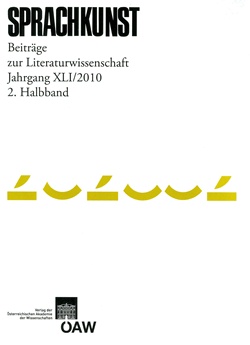
Sprachkunst Jahrgang XLI/2010/2. Halbband, pp. 171-192, 2012/07/18
Beiträge zur Literaturwissenschaft

As Heidegger maintained, intellectual discourse often follows the pre-cut channels of conventional academic disciplines and standard conceptual norms. This essay aims to show that Goethe and Heidegger share a common discourse and address related ontological concerns. It suggests that a reading of ›Faust‹ with Heideggerian concepts in mind may add to our understanding of Goethe’s work. Faust, who struggles against human finitude while jousting with his diabolical companion, is driven by a longing, for ‘Erlösung’ into a boundless and timeless Nothing, that parallels the devil’s will to destroy everything.